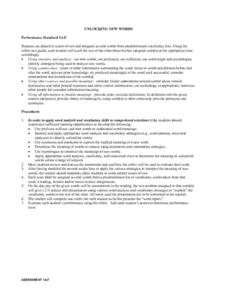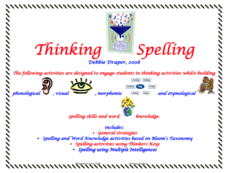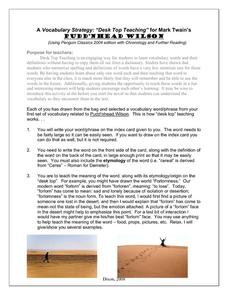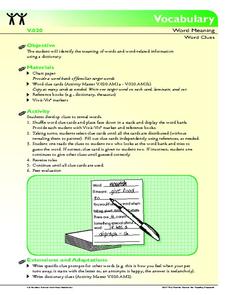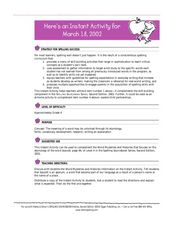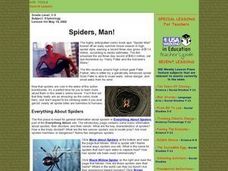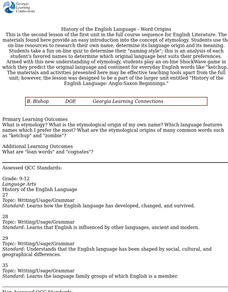ReadWriteThink
Sonic Patterns: Exploring Poetic Techniques Through Close Reading
Robert Hayden's poem "Those Winter Sundays" serves as the anchor text in a five-part lesson that takes the mystery out of poetry analysis by modeling explicit strategies for pupils to employ to conduct a close reading of a poem. After...
Curated OER
Unlocking New Words: Partner Presentations
Following extensive modeling about how to apply word analysis and vocabulary skills to learn new words, partner teams create brief word presentations to teach new vocabulary to the class. Preselect words from upcoming social studies,...
Texas Education Agency (TEA)
Reference Guides (English III Reading)
An interactive resource introduces users to dictionaries, glossaries, and thesauri and the significant differences among these reference guides. Users learn which reference is best for which kind of search, examine sample entries from...
Curated OER
Thinking Spelling
An etymology resource is packed with suggestions for activities designed to build phonological, visual, morphemic, and etymological spelling skills.
Scholastic
What’s the Good Word? Etymology Project Guidelines
Who named the shapes, or the days of the week? Should words be removed from the dictionary if they're no longer commonly used? Are there too many words in the English language? Language arts students explore these and additional...
Saddleback College
The Wonder of Words
If your language arts students think etymology isn't relevant to their everyday lives, show them a presentation that will prove them wrong! The slideshow provides explanation about various words, roots, and suffixes that have adapted in...
Curated OER
Pudd'nhead Wilson: Vocabulary Strategy
Invite your pupils to do the teaching when it comes to the vocabulary in Pudd'nhead Wilson. Each individual is assigned one word to research in depth and teach to classmates, one pupil at a time.
Florida Center for Reading Research
Vocabulary: Word Meaning, Word Clues
Young learners develop a deeper understanding of target vocabulary. In pairs, pupils independently complete a series of word clue cards, asking them to find information about key terms, including their definitions, synonyms, antonyms,...
Curated OER
Who Invented English Anyway?
In these English lesson plans, young scholars use video, the Internet and non-fiction essays to research the history of the English language. They write a short research paper and design a PowerPoint presentation showcasing their findings.
Curated OER
Mythological Word Origins
No wonder the ship was called the Titanic. An investigation of Norse, Roman, and Greek Mythology provides insight into mythological characters and corresponding words in the English language. A close look at roots, prefixes, and suffixes...
Ohio Department of Education
Word Origins
Understanding a word's etymology can really help with decoding and building vocabulary skills. Readers compare and contrast words of similar origins but with different difficulty levels. They focus on prefixes, suffixes, and affixes....
Curated OER
Root Words from Greek and Roman Gods' Names
Prepare a stack of index cards with a Greek or Roman god's name on one side and their description on the other. Then, use the worksheet attached to brainstorm as many words that contain the root from each card. Pupils also create their...
Curated OER
Spanish in English
What do the words alligator, armadillo, and cockroach all have in common? Each one is an English word with Spanish origins. Introduce young etymologists to the joys of discovering word origins with a lesson that asks them to create a...
Curated OER
Internet Adventures
Students explore where words come from. Every word had a beginning--- a birth. They use the internet and go to a web site given by the teacher to take a quiz on word origins, students are allowed to use dictionaries.
Curated OER
Language Change: The Origins of Names
In small groups or pairs, learners explore the origins of each others' names. An awesome idea, but you'll need to do the initial research to gather your class's names and their origins. Or, consider having each member of your class...
Curated OER
Word Families
This phonics PowerPoint presents sets of word families featuring /a/ and /o/. Each of the words is accompanied by a picture. Students practice sounding out each of the words.
Curated OER
Persuasive Text: Vocabulary Charades
Students play charades to act out vocabulary words that have recently been introduced in class. In this vocabulary lesson students may work in groups or in pairs.
Curated OER
Unlocking Word Meanings
Fourth graders investigate eponyms in the English language. In this eponym lesson, 4th graders participate in a teacher led lesson on the definition of an eponym. They complete a worksheet in which they determine which eponym became part...
Curated OER
Connection to Language Arts-Hidden Meanings
In this etymology learning exercise, students read about the history of naming words and how words are named. They think critically by answering three questions about the meaning of words, etymologies and the derivation of words.
Curated OER
Etymology1 Word Search Puzzle
In this word search worksheet, students locate 30 words given in the word box. Students find the words in a puzzle consisting of 15 rows and 35 columns.
Curated OER
Etymology Adventures
High schoolers use the internet to research the field of Etymology. Using this information, they create a list of words they were unfamiliar with along with their origin. They complete numerous activities by reading and following...
Curated OER
Diversity of Languages
Learners interpret graphs and statistics to recognise and understand the cultural and linguistic diversity of Australia. They create a profile of the linguistic diversity of the class or school. Students discuss Australia's cultural...
Curated OER
Spiders, Man!
Pupils conduct online research to learn more information about spiders. They take a current issue of their local newspaper and add spiders to the pictures where spiders might live.
Curated OER
History of the English Language - Word Origins
Learners use on-line resources to research their own name, determine its language origin and meaning. They take an on-line quiz to determine their "naming-style."



